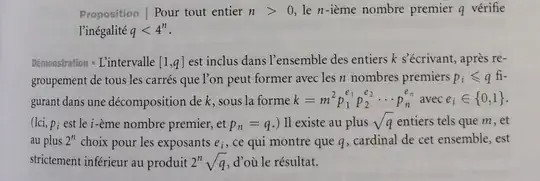Prove that $\forall n \in \mathbb{N}^*, P_n \lt 4^n$ where $P_n$ is the $n$th prime number. I'm searching for a proof that doesn't use induction and uses only the elementary concepts of number theory.
This theorem appears in an old french book on Arithmetics destined to high school level students (lycée). It is introduced right after the concept of decomposition into prime factors. The book includes a proof that I didn't understand. You can see below a screenshot taken from the book and a translation attempt.
 Theorem
For all integers $n \gt0,$ the $nth$ prime number $q$ verifies the inequality $q \lt 4^n$.
Theorem
For all integers $n \gt0,$ the $nth$ prime number $q$ verifies the inequality $q \lt 4^n$.
Demonstration The $[1,q]$ interval is included in the set of integers $k$ that can be written, (after grouping all the squares that can be formed with the $n$ prime numbers $p_i \le q $ in a decomposition of $k$), as $k = m^2p_1^{e_1}p_2^{e_2}...p_n^{e_n}$ with $e_i \in {0,1}$. (Here, $p_i$ is the i-th prime number, and $p_n = q$.). There are no more than $\sqrt{q}$ integers like m, and at most $2^n$ choices for the exponents $e_i$, what shows that $q$, cardinal of this set, is strictly lower than the product $2^n\sqrt{q}$, then the result.